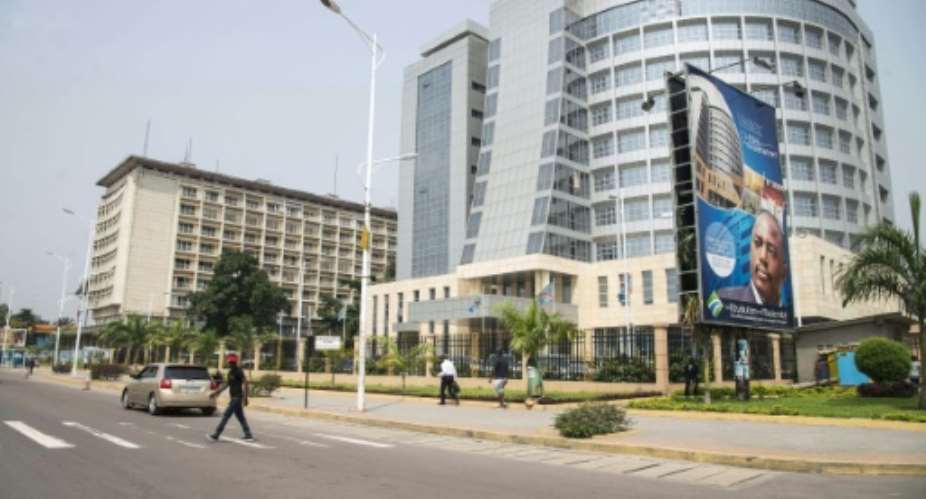Kinshasa on Monday closed off its upmarket business district for two weeks and began large-scale disinfection in a bid to root out DR Congo's main suspected source of coronavirus.
Access to Gombe, which houses the country's main institutions, banks and foreign embassies as well as upscale homes, was barricaded off to everyone except local residents and key workers, an AFP journalist saw.
"The choice of this district is linked to the fact that it's from Gombe that the virus is spreading little by little to other districts," the health authorities said in a daily statement.
"Massive disinfection of the offices and main buildings in Gombe district has been scheduled during this period. Once everything has been cleaned in Gombe, other areas will be targeted," it said.
On Thursday, Kinshasa Governor Gentiny Ngobila announced that Gombe, one of the capital's 26 districts, would be "placed in quarantine" from April 6 to 20.
The district "is considered to be the epicentre of the epidemic in the city," he said.
'Republic of Gombe'
According to the Democratic Republic of Congo's official figures, the sprawling country has recorded 161 cases of coronavirus, 18 of them fatal.
Almost all have occurred in the capital, with a handful of other cases in the volatile east.
The central business district, home to 100,000 to 200,000 of Kinshasa's 10 million people, has been dubbed "the Republic of Gombe" for its perceived status as an island of prosperity, a place set side from a city where poverty and dysfunction are rife.
People waited patiently to get through the barricades, clutching passes issued by city hall.
"I waited more than two hours, but I'm not complaining, because this disease is very deadly," said Jerome Lumosi, 35, who works at the National Institute of Biomedical Research -- the DRC's scientific vanguard in the fight against coronavirus.
During the partial lockdown, teams in Kinshasa will "look for sick people but also investigate risk contacts and asymptomatic cases" for testing and treatment, the authorities said.
People who go to work in Gombe -- drivers, gardeners and so on -- will be tested in their home districts and will be quarantined if they have the virus.
Economic bill
The total of known coronavirus infections in Africa as a whole is nearly 9,300, of which 444 have been fatal, according to an AFP tally.
Experts say that, as elsewhere, the true number of infections is likely to be far higher -- but Africa is especially vulnerable to the disease given its packed urban slums, poor sanitation and sub-standard health care.
Dozens of countries around Africa have imposed restrictions on mobility such as curfews, lockdowns, flight bans and school closures.
 Closed: A market in Abidjan, Ivory Coast's economic hub. By ISSOUF SANOGO (AFP)
Closed: A market in Abidjan, Ivory Coast's economic hub. By ISSOUF SANOGO (AFP)
Kenya on Monday imposed a three-week ban on movement in and out of the capital Nairobi, second city Mombasa and the coastal towns of Kilifi and Kwale.
President Uhuru Kenyatta, in a TV address to the nation, stopped short of a full lockdown in these areas but warned: "We must be ready to go even further if necessary."
The African Union said nearly 20 million jobs could be threatened if the pandemic continues, and countries relying heavily on tourism and oil production stand to be hit especially hard.
It put forward a "realistic" scenario in which the pandemic lasts until July but Africa "is not very affected", and a "pessimistic" scenario in which it lasts until August and Africa suffers more.
The first would cause the African economy to shrink by 0.8 percent and the second would cause it to shrink by 1.1 percent -- both far cries from the 3.4 percent growth the African Development Bank projected for the continent before the pandemic hit.
The AU suggested that the African Union Commission "lead negotiations of an ambitious plan for the cancellation of total African external debt", valued at $236 billion.
Separately, Nigeria, Africa's most populous country and biggest economy, said it had asked for $6.9 billion from multilateral lenders including the International Monetary Fund (IMF) and World Bank.
The government has said it is planning to establish a $1.3 billion fund to bolster the country's weak healthcare system.
But that comes at a time when officials are being forced to slash the budget after the collapse in oil prices.





 We’ll protect state wealth from opaque deals – Prof Jane Naana
We’ll protect state wealth from opaque deals – Prof Jane Naana
 Mauritania president says running for second term in June polls
Mauritania president says running for second term in June polls
 I won't ever say I was a mere driver’s mate' — Prof. Opoku-Agyemang
I won't ever say I was a mere driver’s mate' — Prof. Opoku-Agyemang
 2024 polls: 'EC struggling to defend credibility'— Prof. Opoku-Agyemang
2024 polls: 'EC struggling to defend credibility'— Prof. Opoku-Agyemang
 Akufo-Addo gov't's 'greed, unbridled arrogance, unrestrained impunity, sheer dis...
Akufo-Addo gov't's 'greed, unbridled arrogance, unrestrained impunity, sheer dis...
 Election 2024: Ghana needs an urgent reset, a leadership that is inspiring – Ma...
Election 2024: Ghana needs an urgent reset, a leadership that is inspiring – Ma...
 Partner NDC to rollout a future of limitless prospects – Prof Jane Naana Opoku-A...
Partner NDC to rollout a future of limitless prospects – Prof Jane Naana Opoku-A...
 NPP will remain in gov’t till Jesus comes — Diana Asamoah
NPP will remain in gov’t till Jesus comes — Diana Asamoah
 Sunyani Technical University demands apology from former SRC president over sex-...
Sunyani Technical University demands apology from former SRC president over sex-...
 'Dumsor' was resolved by Mahama but ‘incompetent' Akufo-Addo has destroyed the g...
'Dumsor' was resolved by Mahama but ‘incompetent' Akufo-Addo has destroyed the g...
